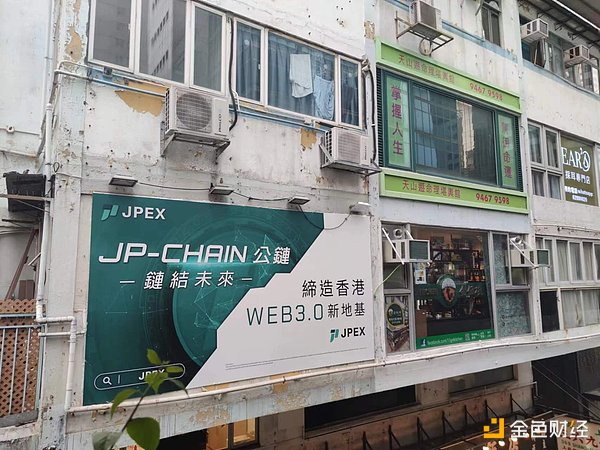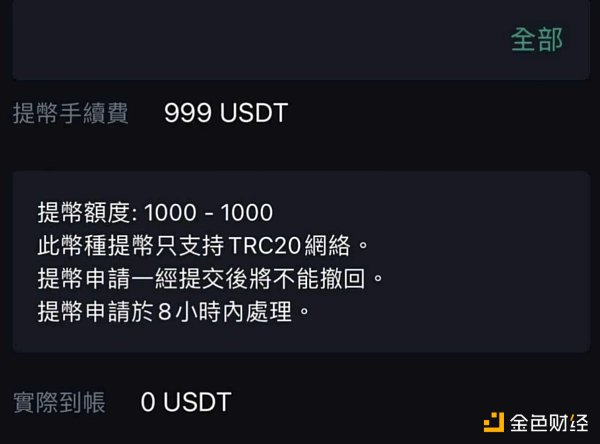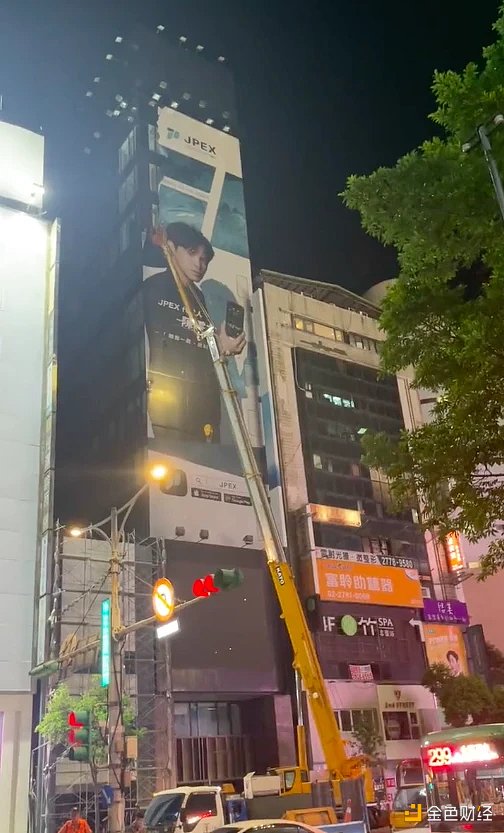The story behind the exorbitant withdrawal fees A complete review of the JPEX incident
The story of high withdrawal fees and the JPEX incident review.Author: 0xAyA
The JPEX exchange, which claims to be “building a new foundation for Web3 in Hong Kong,” is currently in deep trouble. As of the time of writing, more than 2,000 people have reported being victims in cases involving the JPEX exchange, with a total amount of 1.3 billion Hong Kong dollars involved. Some Hong Kong media outlets have even dubbed this case as the “largest financial fraud in history.” Among the 11 arrested suspects, there are not only personnel related to the exchange, but also KOLs who previously cheered for it.
On the first day of Token 2049, this exchange still had a presence in the exhibition area, presenting itself as a “regulated and compliant” exchange. However, not long after, due to incidents such as “withdrawal of 1000 USDT with a 999 USDT fee,” JPEX was investigated by the police and even mentioned by the Chief Executive. What exactly happened behind the scenes?

- ArkStream Capital Social veteran native ecology breaks through the competition with FT and Telegram ecology – Lens creates the ambition of Layer 1 social chain
- Consensys and zkSync have successively launched the Fellowship program, is the competition in Layer 2 entering the melee stage?
- What investment opportunities does the Ethereum Cancun upgrade hold?
Timeline
On September 13th, the Securities and Futures Commission of Hong Kong issued a warning statement on its official website regarding “unregulated virtual asset trading platforms.” The statement reads as follows:
The Securities and Futures Commission has noted a virtual asset trading platform called “JPEX,” which actively promotes its services and products to the Hong Kong public through social media influencers and over-the-counter virtual asset dealers.
The Commission hereby clarifies that no entities under the JPEX group have been licensed by the Commission and have not applied for a license to operate a virtual asset trading platform in Hong Kong.
The Commission has also observed numerous suspicious practices employed by JPEX and those who actively promote JPEX to the Hong Kong public:
(a) JPEX states on its website that it is a “licensed and accredited digital asset and virtual currency platform.” It claims to have obtained licenses to operate virtual asset trading platforms from several overseas regulatory authorities, which is not true.
(b) JPEX offers extremely high returns on some of its products.
(c) The Commission has received complaints from retail investors and noted media reports that some retail investors were unable to withdraw virtual assets from their accounts at JPEX or found their account balances reduced and manipulated.
(d) Some of the products offered by JPEX appear to involve arrangements related to virtual assets, such as “deposits,” “savings,” or “profits,” which are not allowed under the Commission’s regulatory regime for virtual asset trading platforms.
(e) JPEX promotes on its website and in local advertorials that it has entered into business cooperation with a listed company in Hong Kong and has received investments from that company, but in fact, the cooperation has been terminated and the listed company has not made any investment.
(f) Social media influencers and over-the-counter virtual asset dealers have made false or misleading statements on social media, claiming that JPEX has independently or jointly with a listed company in Hong Kong applied for a license to operate a virtual asset trading platform in Hong Kong, while in fact, no entities under the JPEX group have ever submitted any application for a license to the Commission for a virtual asset trading platform. The Commission has notified the relevant influencers and over-the-counter dealers of its suspicions and concerns and has requested them to cease promoting JPEX and its related services and products.
The Commission has notified the relevant influencers and over-the-counter dealers of its suspicions and concerns and has requested them to cease promoting JPEX and its related services and products.
Just an hour after the announcement from the China Securities Regulatory Commission, JPEX Exchange suspended its withdrawal service and retaliated by publishing a statement on its official website. It stated that it “intends and plans to apply for a license” and pointed out that the actions of the China Securities Regulatory Commission “are actually putting pressure on the cryptocurrency industry and contradict the direction of implementing the policy of Web 3.0, which the Special Administrative Region government intends to build Hong Kong as a Web 3.0 metropolis”.
In the early hours of the 14th, some users of JPEX Exchange started to react on social platforms, stating that their withdrawal limit on the exchange was restricted to 1000 USDT, with a transaction fee as high as 999 USDT.

The next day, enthusiastic individuals reported that the JPEX booth, which was promoted at token 2049 the previous day, was now empty. Regarding the issue of withdrawing funds from the exchange, the China Securities Regulatory Commission stated that it would be handed over to the police for follow-up. Subsequently, JPEX published a special announcement on its official website, stating that the platform will gradually adjust the withdrawal fees based on the response from the China Securities Regulatory Commission, and will open the withdrawal limit in stages. For users with urgent withdrawal needs, they can fill out an application form for priority withdrawal, and the withdrawal fee will be reduced to 980 USDT, which is “very considerate”.
Data analysis company Bitrace tweeted that the related addresses of JPEX Exchange had suffered significant fund contamination. The recharge address of one of its hot wallets had received over 190 million risky USDT in the past 20 months, and the two addresses with the highest number of transfers to this hot wallet were both high-risk addresses. The risk types marked for these addresses were “money laundering” and “black-gray industry”.
The incident escalated further when Block Times reported that JPEX had claimed to spend a sky-high monthly rent in Taipei to become the “Asia Blockchain Tower,” the core blockchain base in Asia. However, the place is now empty, and the poster of famous KOL Chen Lingjiu is still hanging on the facade. Block Times later responded and stated, “After learning about the JPEX incident, we wanted to help understand the situation. However, we are currently unable to contact any relevant personnel from JPEX. The company is handling other details, and we will fully cooperate if there is any investigation needed.” They admitted that the cooperation had ended at the end of July.

Other KOLs and celebrities who had partnered with the exchange also began to distance themselves from JPEX. Lin Zuo, a “JPEX partner,” announced on social media that he would stop promoting any exchange in Hong Kong without a license, and his OTC business was also temporarily suspended. He described his own losses as “not much better.” Several influencers who had previously promoted JPEX, including Huang Zejie, who was arrested for throwing money in Sham Shui Po in 2018, have removed JPEX-related videos from their social platforms. On Instagram, they stated that they would not publicly promote or mention any exchange in Hong Kong that had not applied for a license, in order to comply with regulations and the requirements of the China Securities Regulatory Commission. Zhang Zhilin, who had shot endorsement advertisements for JPEX, responded through his agent, saying, “I just noticed that Zhang Zhilin’s image was being used by JPEX and felt helpless.” Previously, Zhang Zhilin received an invitation to shoot the advertisement. At that time, JPEX told them that they were registered overseas and provided proof, so they arranged the shoot in March last year. However, in May last year, they learned that JPEX “had been regulated by the China Securities Regulatory Commission” and had formally notified JPEX in writing that they should not use Zhang’s image for any advertising promotion until they obtained a license in Hong Kong. They ultimately stated that they would “reserve the right to pursue JPEX.”
On the 15th, JPEX issued a special announcement again, stating that it had closed the gaming hall function in accordance with the instructions of the Hong Kong Securities and Futures Commission, and the Hong Kong police stated that the Commercial Crime Bureau is following up on the case and called on complaints about JPEX to be reported through the electronic reporting system. After attending an event on the second day, Siu Tse-yi, the Commissioner of Police for the Hong Kong Special Administrative Region, met with the media and responded to the JPEX fraud and Cyberport data leakage case, stating that the police received the case transferred by the Securities and Futures Commission the day before yesterday, and because it may involve elements of fraud, it is now being followed up by the Commercial Crime Bureau. As of 3 pm on the 15th, 83 people reported the case, involving approximately HKD 34 million.
On September 17th, JPEX issued an announcement stating that due to the restriction of liquidity by the third-party market maker on the platform and in accordance with policy guidance, it will delist all transactions on the wealth management page and will recover liquidity from the third-party market maker as soon as possible, gradually adjusting the withdrawal fee to a normal level. At the same time, JPEX stated in the announcement that it will form a DAO and restructure the architecture to “solve the problem” and select a reasonable solution for user voting.
On September 18th, the Commercial Crime Bureau formally arrested KOL Lin Zuo and another internet celebrity Chen Yi on charges of fraud. It is reported that Lin Zuo opened a cryptocurrency trading company in Central last month and publicly announced on social media that he has applied to become a partner of JPEX, revealing that one of his incomes reached as high as HKD 740,000 and said, “It’s much more profitable than doing insurance before.”
On September 19th, Carrie Lam, the Chief Executive of the Hong Kong Special Administrative Region, said that regarding the case of the virtual asset trading platform JPEX, she has requested the police and the Securities and Futures Commission to meet with the media this afternoon to explain the relevant events. She stated that this incident reflects the importance of regulation, including the need to invest in regulated and licensed trading platforms, the importance of individuals’ understanding of virtual assets and related risks, and emphasized that the current licensing system is to protect investors. The Securities and Futures Commission will monitor market changes to ensure that investors’ interests are fully protected, and the authorities will also vigorously promote investor education.
In the afternoon, the police held a briefing on the case, stating that as of 10 am on the 18th, the police had received 1,641 reports involving approximately HKD 1.2 billion, and had arrested 4 men and 4 women involved in conspiracy to defraud. In the operation, HKD 8 million in cash was seized, and more than HKD 12 million in bank deposits and HKD 44 million in property were frozen, totaling HKD 67 million in suspicious criminal proceeds.
Senior Superintendent Kong Hing-fun of the Commercial Crime Bureau said that JPEX used advertisements, social media, over-the-counter exchange shops, and KOL promotion to promote platform services, claiming low risk and high returns. Many of the victims in the case lacked experience in investing in virtual currencies. He described the returns claimed by JPEX as “too good to be true” and would advise users to convert other cryptocurrencies into JPEX’s JPC tokens, which have little liquidity on other platforms. Some victims even handed over the “private keys” of their encrypted assets to JPEX. He also stated that he noticed the strong response from JPEX in the incident, and the investigation is being conducted comprehensively and from multiple angles, with the behind-the-scenes individuals of JPEX also being investigated.
According to Huang Lexinze, the head of the China Securities Regulatory Commission’s Financial Technology Group, the CSRC did not have the authority to regulate virtual asset trading platforms under the existing regulatory framework. However, as early as July 2022, JPEX was already listed as an unlicensed company and a suspicious website, with a public warning. Since the new mandatory regulatory system came into effect in June of this year, all platforms that have not applied for a virtual asset trading platform license need to orderly terminate their operations in Hong Kong. However, JPEX neither applied for a license nor terminated its operations. On August 7th, it issued an anonymous warning to the public to be aware of the risks of unlicensed virtual asset trading platforms. However, JPEX escalated its actions and was specifically named in a warning on September 13th, demanding KOLs and OTC stores to stop promoting JPEX. If a list of “virtual asset trading platforms under application” is made public, it could create the misconception that these platforms are subject to regulation, so only the arrangements for publishing licensed virtual asset trading platforms will be maintained.
The police have identified five elements that constitute suspected fraud based on JPEX’s operating model and promotional methods:
JPEX does not have a license from the CSRC, but its website claims to be a “licensed and recognized digital asset and virtual currency platform.” It further promotes itself through advertisements, media, OTC stores, and influencers to attract investors.
Influencers make false and misleading statements and create the appearance of “getting rich by buying coins” online, increasing persuasiveness. However, since the CSRC had already issued warning letters to relevant individuals and physical stores beforehand, there is reason to believe that the individuals involved were aware of JPEX’s illegal practices but still promoted them to customers.
After registering with JPEX, users can exchange different cryptocurrencies on the platform or transfer virtual assets from foreign platforms to their JPEX accounts for trading. However, the investigation found that JPEX also issued a virtual currency called JPC, which is different from other mainstream cryptocurrencies. JPC cannot be traded on other platforms or used for payment purposes. Some victims were persuaded to purchase JPC and use it as a so-called “pledge” similar to a fixed deposit, with the promise of high returns after the pledge period. JPEX also requires customers to provide their private keys to store their cryptocurrencies, effectively controlling the customers’ assets.
After being warned by the CSRC, JPEX arbitrarily set a limit of 1000 USDT on asset withdrawals for users and charged a 999 USDT handling fee, effectively restricting asset withdrawals.
As of the early morning of the 18th, JPEX has taken down all wealth management and trading services on its website.
On the evening of the 19th, the 8 individuals who were arrested in connection with the case were granted bail pending further investigation. However, they are required to report to the police in mid-October. Prior to this, the official website of JPEX announced its registration with the Australian Securities and Investments Commission (ASIC) under the name “JP-EX Crypto Asset Platform Pty Ltd.” However, on September 19th, the company applied for voluntary deregistration with ASIC, with Jieyi Chen, the director of the company, as the applicant.
On September 20th, the China Securities Regulatory Commission (CSRC) issued another statement regarding JPEX, stating that JPEX claims to be a virtual asset trading platform and is not regulated. Since March 2022, the CSRC has been closely monitoring the platform and conducting investigations into the false and misleading statements and unlicensed activities allegedly made by the platform. Due to JPEX’s uncooperative attitude and failure to provide substantial responses to the CSRC’s requests, the CSRC subsequently included JPEX in its list of unlicensed companies and suspicious websites in July 2022. The CSRC confirmed that JPEX has never contacted the CSRC regarding the possibility of obtaining a license, and none of the entities under the JPEX group have obtained a license from the CSRC or applied for a license to operate a virtual asset trading platform in Hong Kong. Therefore, there has been no communication between the CSRC and JPEX regarding licensing matters.
On the same day, some users reported that users of Hong Kong telecommunications service providers 1010 and CSL were unable to use the JPEX mobile app. It is understood that all local telecommunications service providers in Hong Kong have received instructions from the police to block the app, which means that other telecommunications service providers may also block the app in due course.
On September 21st, the Hong Kong police reported updated information on the JPEX case and arrested three more men suspected of conspiracy to commit fraud yesterday. They are currently detained for investigation, and a total of 11 people have been arrested in the case so far. As of 5 pm on September 20th, the police have received a total of 2,086 reports from victims, involving an amount of approximately 1.3 billion Hong Kong dollars. The police stated that the investigation is still ongoing and did not rule out the possibility of more arrests. Earlier today, celebrity actor Raymond Lam, who was involved in shooting advertisements for JPEX, also went to the Hong Kong Police Headquarters to assist in the investigation. Later that day, Starry Lee, the Chairperson of the Democratic Alliance for the Betterment and Progress of Hong Kong, along with Election Committee member Chan Chung-ni and accounting sector legislator Kenneth Leung, jointly wrote to the Financial Affairs Committee of Hong Kong, expressing that the JPEX incident is serious and requesting that the JPEX incident be discussed as an additional agenda item at the meeting on October 9th, and the Hong Kong Securities and Futures Commission will be invited to attend to provide further explanation.
Meanwhile, Secretary for Financial Services and the Treasury Christopher Hui attended a reception for the 74th anniversary of the founding of the People’s Republic of China and the 26th anniversary of the establishment of the Hong Kong Special Administrative Region on the 21st, and expressed great concern about the incident. He emphasized the importance of investor education and stated that when the financial services industry recommends any investment project to investors, the risks should be clearly disclosed. Legislative Council member Wilson Or also stated in his speech that the JPEX incident proves that it is correct for Hong Kong to establish a sound virtual asset licensing system. He urged the public to use licensed institutions and reputable companies and not to easily trust so-called internet celebrities or investment experts without licenses. He reminded the public that there is no investment product that offers extremely high returns without any risks.
On September 22nd, JPEX issued an announcement stating that users registered with Hong Kong phone numbers were unable to receive SMS verification codes due to being blocked by telecommunications companies. JPEX provided emergency withdrawal methods in the announcement, where users can use the last six digits of their registered phone number instead of the SMS verification code. JPEX also reminded users who registered with Hong Kong phone numbers to immediately bind their accounts with an email address to ensure the security of their assets.
Conclusion
While the Hong Kong government encourages support for Web3, the policies are still incomplete. JPEX’s extensive promotion and involvement in record-breaking amounts undoubtedly dealt a blow to the ambitious Hong Kong Web3 industry and further eroded the trust of the general public, who already had little knowledge about the industry. Although the Securities and Futures Commission previously stated during a press conference that they had no power to take any action before the new regulatory mechanism took effect on June 1st, several legislators still criticized the Securities and Futures Commission for “inaction” and “shirking responsibility.”
What will happen to the Hong Kong Web3 industry after this incident? Fong Po Kiu, the Honorary President of the Hong Kong Information Technology Association, said that having regulation does not mean that nothing will happen, but he also added:
“I think there is value in the existence of virtual currencies because you can always see that the whole world is running on them.”
We will continue to update Blocking; if you have any questions or suggestions, please contact us!
Was this article helpful?
93 out of 132 found this helpful
Related articles
- Digging deep into the NFT whale’s position everyone is making money and showing off in various ways, only Huang Lixing is getting beaten up.
- Summary of the 118th Ethereum Core Developer Consensus Meeting Devnet-9 Preparation, Cancun/Deneb Activation Time
- Solidity VS Rust Should smart contract developers choose classics or innovation?
- Can re-collateralization prevent MEV theft? Exploring the new use case of MEV-Boost+ for EigenLayer re-collateralization.
- Solana’s Past, Present, and Future.
- Multicoin Capital DePIN Network Design Space Exploration
- ArkStream Capital Overview of Lens Protocol’s Trends, How to Break Through and Compete with FT and Telegram Ecosystem?





